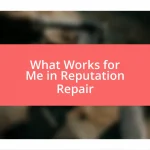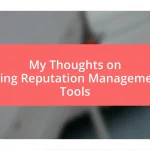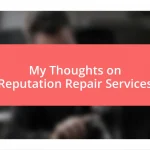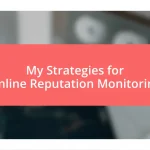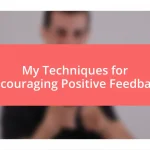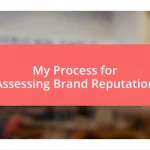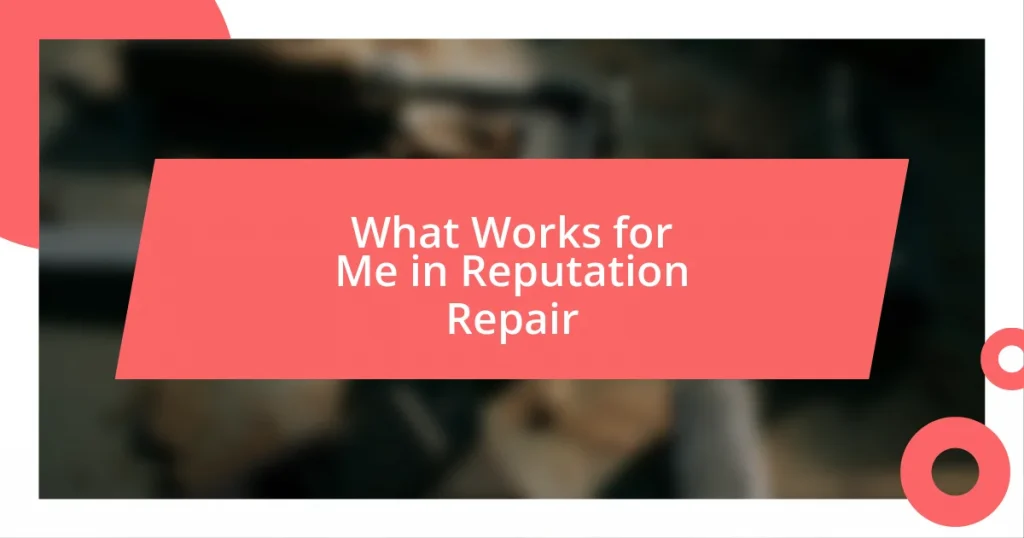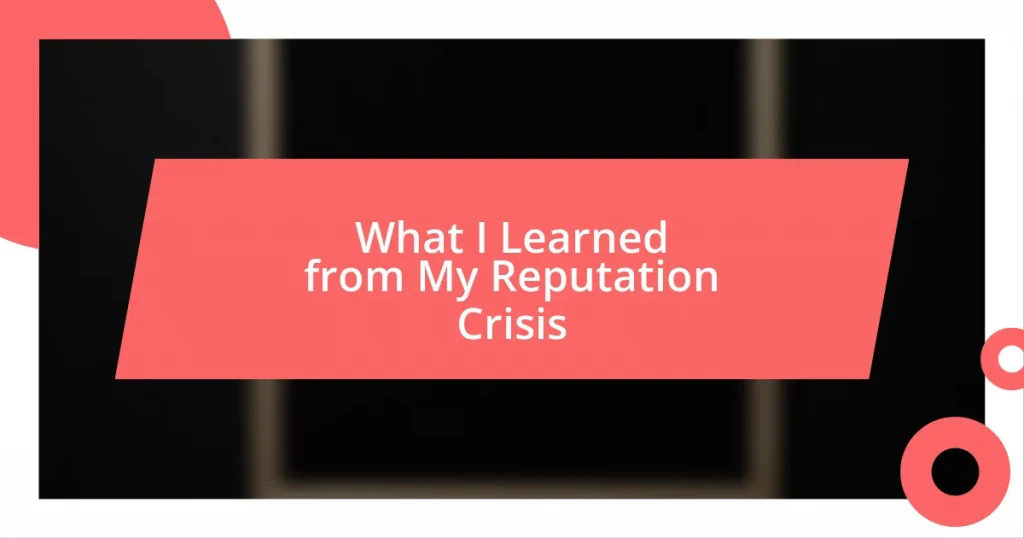Key takeaways:
- Scandals profoundly impact trust and identity, prompting emotional turmoil and the need for recovery strategies.
- Acknowledging and processing emotions, alongside taking responsibility and making amends, are essential steps toward healing.
- Building a support system and fostering transparency can help rebuild public trust and lead to personal redefinition and growth.
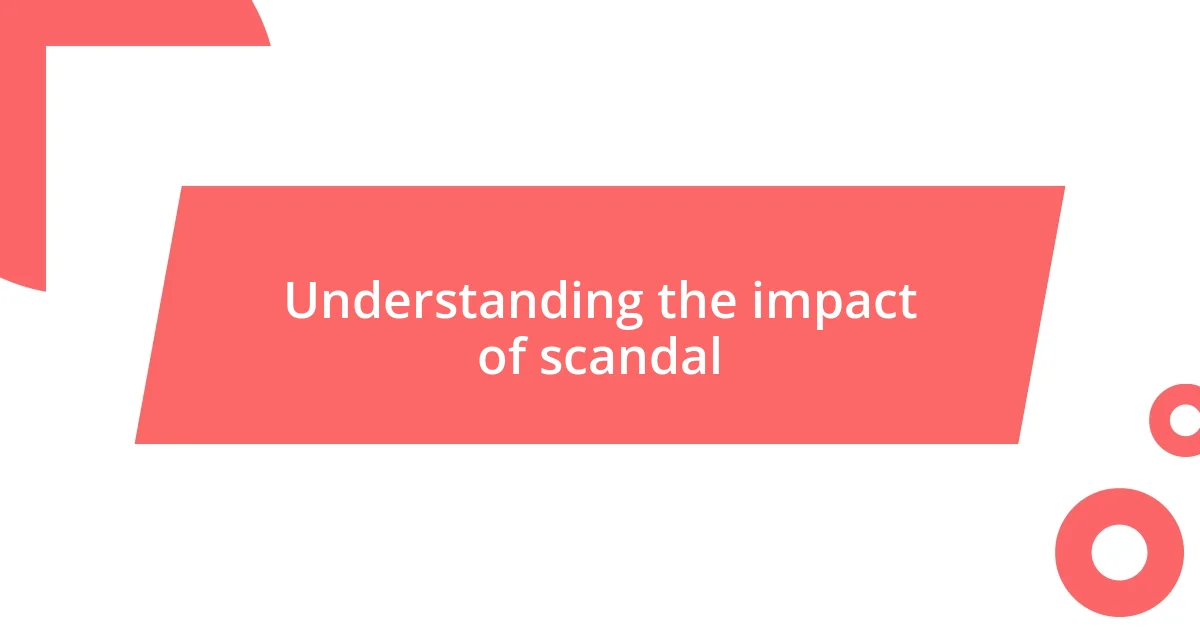
Understanding the impact of scandal
Scandals often ripple through lives, shaking the very foundation of trust, both personally and publicly. I remember when a close friend faced a scandal that not only tarnished their reputation but also shattered their self-esteem. How can one recover when the world seems to see you through a lens of judgment?
The emotional aftermath is often as painful as the initial fallout. I found myself feeling a mix of sympathy and frustration; witnessing someone I cared about lose fragments of their identity was heart-wrenching. It made me ponder: how does society reconcile their hunger for sensationalism with the profound impact on individual lives?
Moreover, the practical consequences of scandals can’t be ignored. Careers are abruptly derailed, relationships dissolve, and the sense of belonging can vanish overnight. I recall how that same friend had to rebuild their social circles, often asking themselves, “Who will stand by me now?” It’s a stark reminder that while scandals might fade from public memory, their effects can linger long after the headlines disappear.
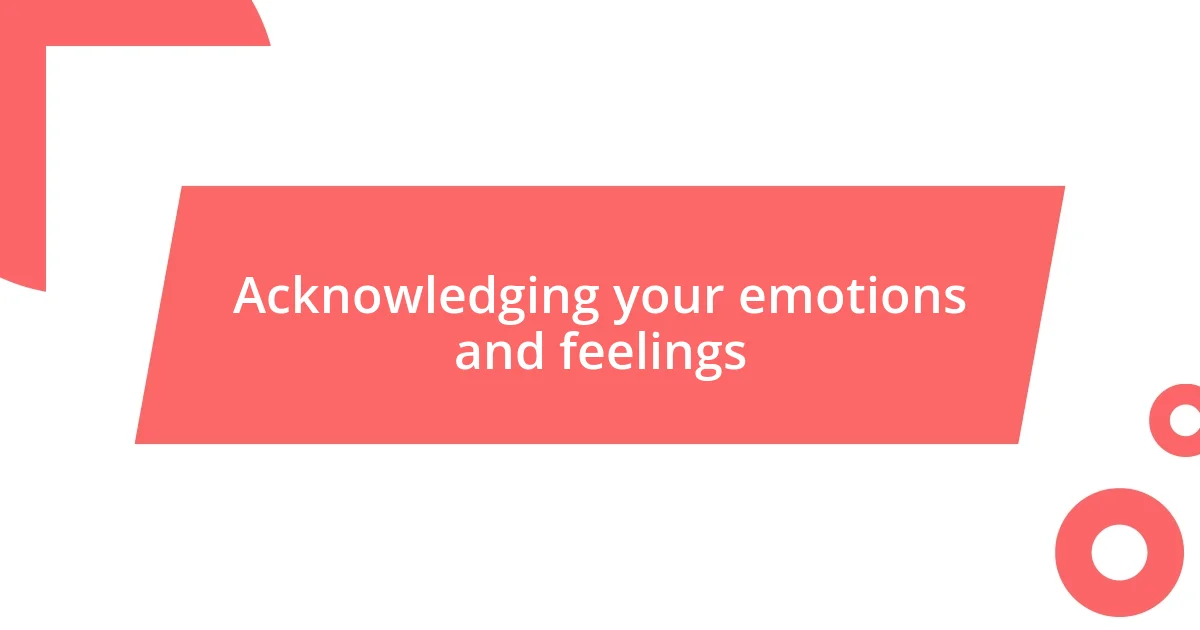
Acknowledging your emotions and feelings
Acknowledging emotions and feelings is a crucial step in navigating the aftermath of a scandal. I vividly remember experiencing a rush of anger and sadness when I witnessed a colleague go through a public debacle. Their struggle became my struggle. It’s surprising how deeply someone else’s turmoil can affect you, isn’t it? Allowing myself to feel those emotions helped me process what was happening. Sometimes, just sitting with that discomfort and allowing it to wash over you is incredibly healing.
I think it’s important to recognize that emotions can be complicated. One moment, you might feel ashamed of your association with the individual embroiled in the scandal, and in the next, you could feel fierce loyalty. I had a similar experience with a family member who faced serious allegations. I grappled with guilt for even feeling supportive, but ultimately, embracing all those conflicting feelings was liberating. It taught me that embracing these emotions doesn’t mean condoning the actions; it just means acknowledging the human experience.
When we allow ourselves to truly feel, something remarkable happens. I once attended a therapy session with a friend who was struggling to cope with their emotions after their public scandal. That space nurtured open dialogues about vulnerability and strength. By processing those feelings together, we cultivated an environment of empathy. In times of crisis, understanding our emotions becomes a powerful tool for recovery and self-discovery.
| Emotion | Possible Response |
|---|---|
| Anger | Talk to someone you trust about it |
| Sadness | Engage in self-care activities |
| Guilt | Reflect on your values and beliefs |
| Confusion | Write down your thoughts and feelings |
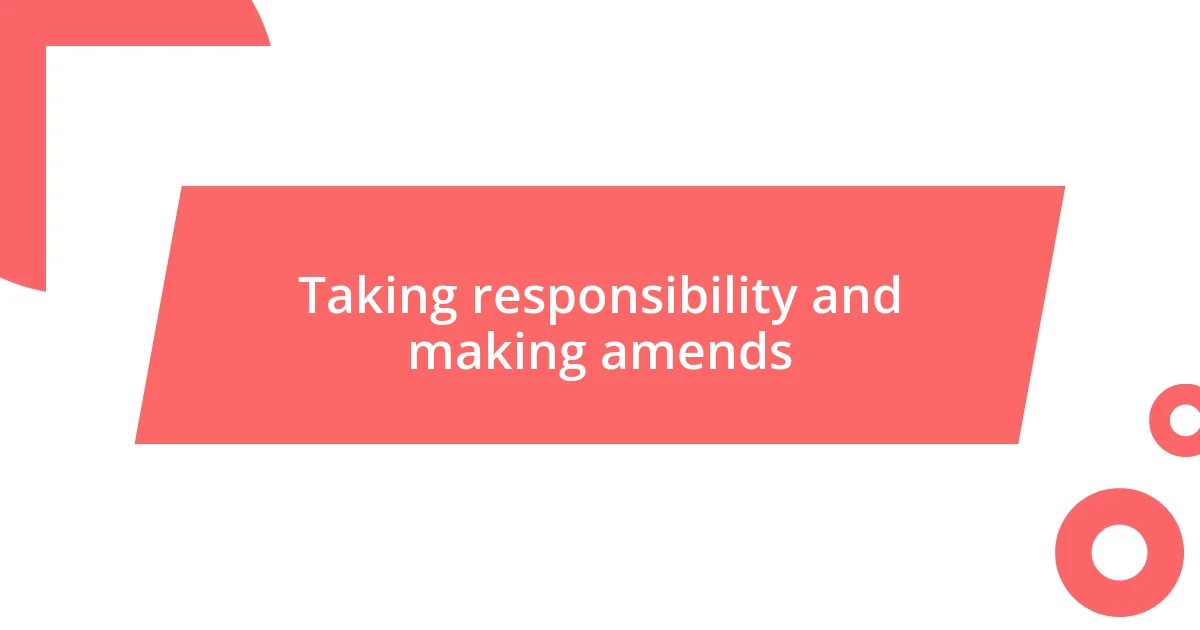
Taking responsibility and making amends
Taking responsibility is about facing the music, no matter how uncomfortable. When a scandal hits, owning up to your role is critical. I remember my colleague who made a public faux pas; instead of shying away, they took steps to apologize openly and address their mistakes. Watching them do this inspired me to reflect on my accountability, which I now recognize as integral to regaining trust.
To effectively make amends, consider the following steps:
- Apologize sincerely to those affected by your actions.
- Acknowledge the impact your behavior may have had on others.
- Offer to take corrective actions that align with your commitment to change.
- Be consistent in your efforts to show that you’re genuinely making amends.
- Seek feedback from those you’ve impacted to understand their perspectives better.
Focusing on rebuilding the bridge you may have burned can pave the way to healing—for you and those you’ve touched.
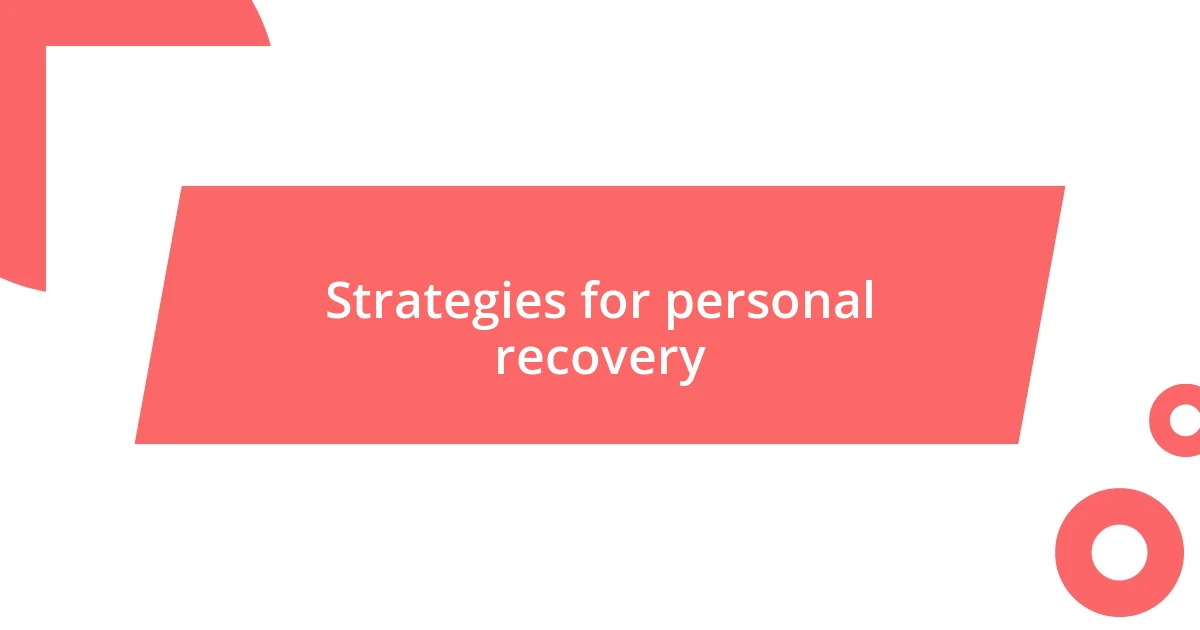
Strategies for personal recovery
Finding a support system is essential for recovery. I recall when I faced a challenging time after a colleague’s scandal—having friends and family to lean on made all the difference. It’s incredible how a simple cup of coffee with someone who understands can provide clarity and comfort. Are you surrounding yourself with the right people? Having that network creates a safe space to express your thoughts and feelings, paving the way for healing.
Replacing negative habits with constructive ones is another strategy I swear by. After grappling with my own emotional turmoil, I picked up journaling as a way to process my thoughts. It’s amazing how writing things down can declutter your mind. Have you ever tried it? I found that articulating my feelings not only lightened my emotional load but also brought clarity to my situation. Instead of dwelling on negativity, I began focusing on personal growth and opportunities, which has been incredibly empowering.
Practicing self-compassion is also key to recovery. I remember a moment of deep self-reflection when I recognized how harsh I could be towards myself during tough times. Instead of berating myself for my association with someone else’s scandal, I chose to treat myself with kindness. It’s not easy, but giving yourself a break can be transformative. How would you treat a friend in your position? By applying that same empathy towards ourselves, we nurture our resilience and begin to heal.
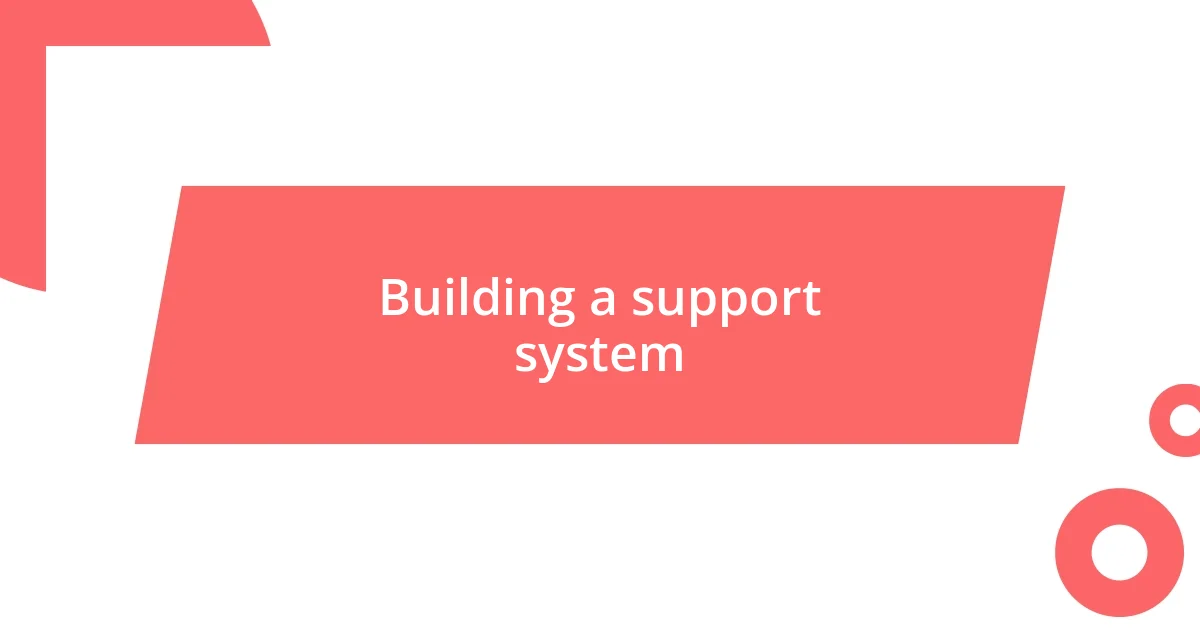
Building a support system
Building a robust support system was crucial for me during my toughest days post-scandal. I vividly remember gathering a small circle of trusted friends who could offer me not just sympathy but honest feedback. There’s something powerful about being able to share your struggles with those who genuinely care—something that lifted my spirits immensely, even when the weight felt unbearable.
Emotional support can come from unexpected places, too. I stumbled upon a local support group, where I met people who had navigated similar situations. Listening to their stories made me realize I wasn’t alone in this journey. Have you ever felt that sense of connection with others? It’s like finding a lifeline, reassuring you that healing is a communal process.
Moreover, I learned to cherish the role of mentors in my life, people whose experiences guided me through uncertainty. I reached out to someone I respected, and their willingness to share wisdom provided me clarity I desperately needed. Engaging with individuals who have faced their own challenges fosters hope and perspective, nudging you toward growth, don’t you think? Each interaction can be a stepping stone toward rebuilding your life and regaining your footing.
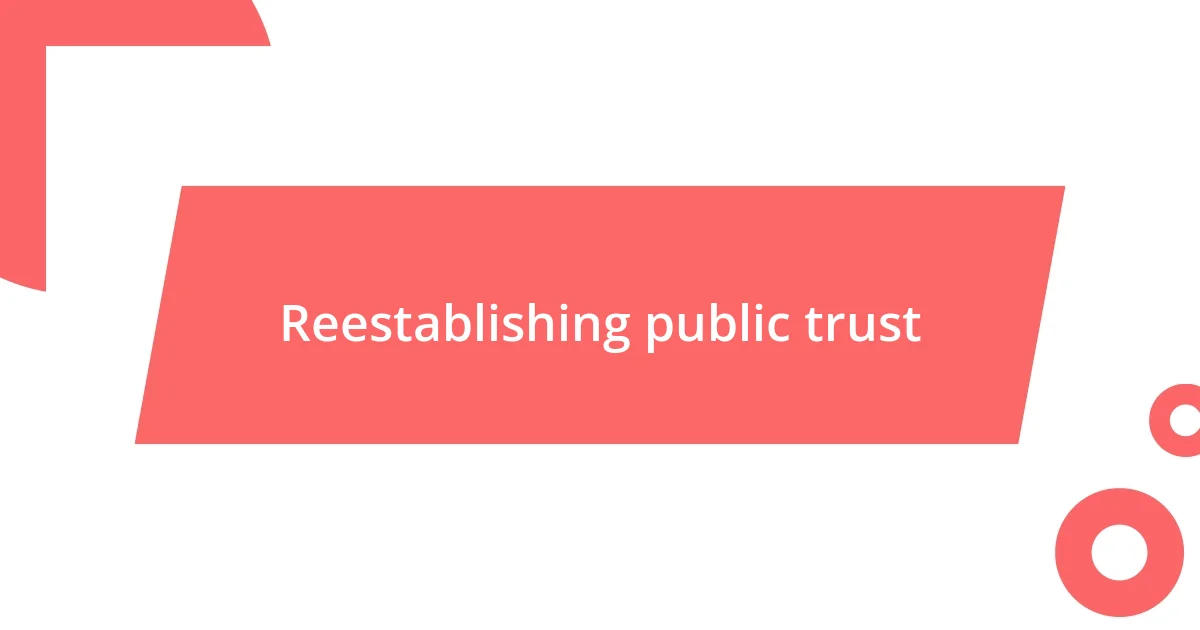
Reestablishing public trust
Reestablishing public trust after a scandal is no easy feat, and I learned firsthand how transparency plays a pivotal role. When I took accountability for my past actions—addressing my mistakes openly—it opened the door for genuine conversations. Have you ever seen how honesty can change the atmosphere in a room? By being upfront, I found that people were more willing to listen and engage rather than judge.
During my journey to regain trust, consistent actions proved to be just as important as words. I made it a point to show up for commitments, even when it felt daunting. For instance, I volunteered for community service, gradually demonstrating my dedication to making amends. Isn’t it fascinating how small, positive actions can slowly chip away at skepticism? That consistent effort communicated a message louder than any apology ever could.
Building meaningful relationships again was crucial, too. I remember reconnecting with colleagues and actively seeking their input on projects. This collaboration not only reinforced my commitment to professional growth but also showed them I valued their trust. It’s a powerful reminder—what are you doing to foster connections that rebuild trust in your life? Learning to listen, engage, and respect others’ perspectives can breathe new life into relationships strained by past events.
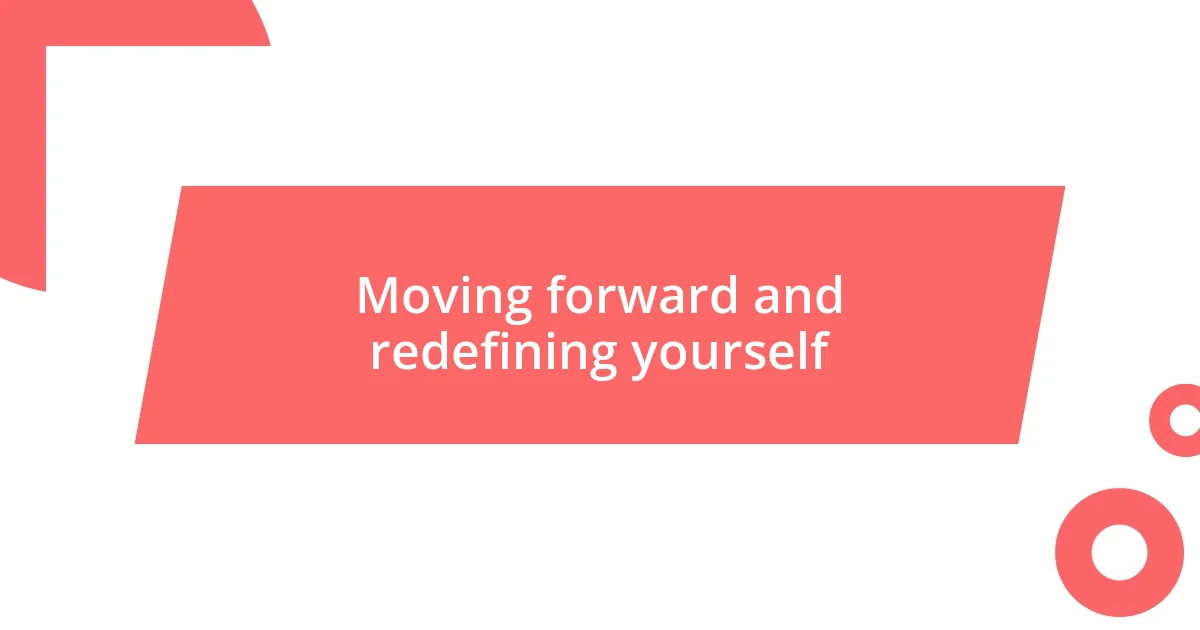
Moving forward and redefining yourself
Redefining yourself after a scandal can feel like a daunting task, but it holds incredible potential for personal growth. I remember standing in front of the mirror, contemplating who I wanted to become. Instead of sulking in my past, I started setting small, achievable goals that reflected my true values. The shift from self-doubt to self-discovery was quite empowering, don’t you think? Each little win built my confidence and helped me forge a new identity.
As I moved forward, I discovered the importance of self-compassion. There were days when I was my own worst critic, replaying my mistakes on loop. One afternoon, while journaling, I realized how much I needed to forgive myself. This practice not only eased my burden but also allowed me to embrace my imperfections as part of my unique story. Isn’t it fascinating how self-forgiveness can act as a catalyst for transformation?
Continuously learning from the past was equally crucial in my redefinition journey. I immersed myself in books and workshops that focused on personal development. Reflecting on what I learned from each experience helped solidify my new direction. Have you ever experienced that “aha” moment when an insight resonates deeply? I cherished those moments, for they guided me toward a refreshed self-image rooted in resilience and authenticity.
